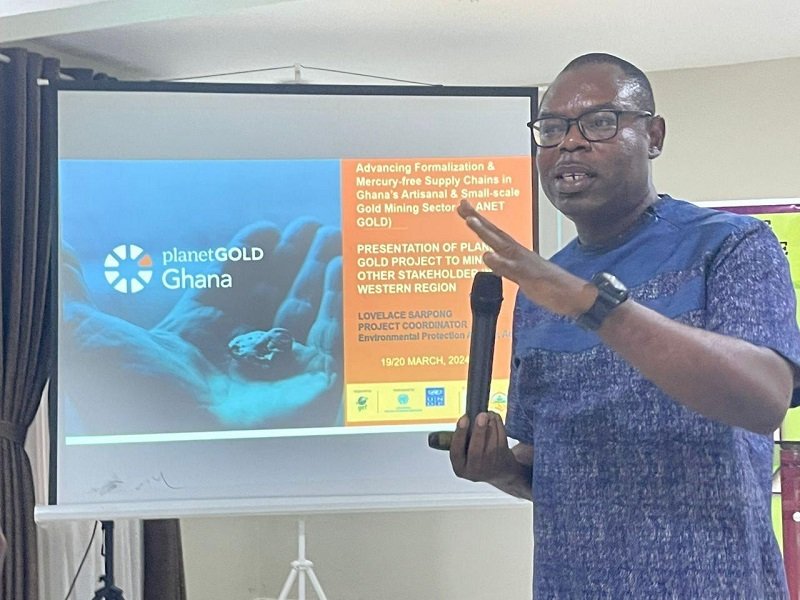Hot!
GRASAG-GIMPA gets first female President

Ms Apetorgbor
The Ghana Institute of Management and Public Administration (GIMPA) chapter of the Graduate Students’ Association of Ghana (GRASAG-GIMPA) has sworn in its first female president.
The historic moment was graced by GIMPA’s Dean of the School of Research and Graduate Studies (SRGS), Professor Wisdom Akpalu.
The swearing-in ceremony was performed by the national president of GRASAG, Mr. Thomas Elorm Tagbotor.
Other members of the new GRASAG-GIMPA executives are Emmanuel Adomako Vice president, Yussif Musah Amadu , General Secretary, Ahlaam Mohammed Treasurer; Bernice Azameti, Gender Commissioner and Ebenezer Angaamwine Sabogu , Organiser.

Speaking at the programme held in Accra on Friday for all elected executives, the president, Ms Judith Sitsope Apetorgbor stated that her new position was not only significant for her as a graduate student but also, a commitment to championing gender equality, inclusivity and empowerment.
“This position is not only significant for me but for every graduate student of GIMPA. As the first female president of GRASAG-GIMPA I see it as an occasion to amplify the voices and support the aspirations of students,” Ms Apetorgbor added.
She mentioned that she would among others focus on cultivating a nurturing and empowering environment where every female student feels valued and motivated to unleash their full potentials.
Ms Apetorgbor also emphasised the significance of mentorship, fostering strong networks and personal growth.
She expressed gratitude to the Management of GIMPA for the trust reposed in appointing the Institute’s first female Registrar, Dr. Mrs. Victoria Kunbour and Acting Deputy Rector and Dean of Students, Dr. Augustina Akonnor.
“Their positions clearly show that nothing is impossible to achieve as females. It is time for women all over the world, irrespective of their backgrounds to rise up, believe in themselves and take up leadership positions.”
“The future is bright and with the needed support, my executives and I will undoubtedly make a profound impact on the lives of our fellow students” she said.
Congratulating the newly sworn-in executives, Professor Akpalu urged them to remain selfless in the discharge of their duties and lead exemplary lives.
He also admonished Ms Apetorgbor to be determined and confident, assuring her of the Institute’s support.
According to the dean of SRGS, it was very necessary for women to be encouraged to take up leadership positions, adding that he was very proud of Ms Apetorgbor’s achievement.
“The school has your support so I am urging all of you to make discipline a hallmark. Serve the student body in all diligence and set good examples for them to follow,” he added.
On his part, the immediate past president of GRASAG-GIMPA, Eric Ofosu Asare in a speech read on his behalf thanked Management of the Institute for the unwavering support received by the past executives during their tenure of office and hoped that GRASAG-GIMPA under the leadership of Ms Apetorgbor would make greater impact on GIMPA’s academic community.
By Raissa Sambou
Hot!
Youth urged to take proactive stance on ozone depletion

•Mr Joseph Amankwah, first counting from, some officials from EPA and UNDP in group picture with the student
Mr Joseph Amankwah, the Director of Ozone Layer and Climate Change at the Environmental Protection Agency (EPA), has urged the youth to take a proactive stance on issues related to ozone depletion, emphasising that their future would be most affected by its consequences.
Speaking during a student engagement event at the Ghana Secondary School (GHANASS) in Koforidua, he highlighted the critical role young people played in tackling climate-related challenges.
Mr Amankwah explained that human activities, such as the use of certain chemicals, were significantly contributing to the depletion of the ozone layer and driving climate change.
He said it was important to educate the youth on these issues, encouraging them to share this knowledge with their families to foster a broader understanding and active participation in climate action.
He urged the education sector to integrate lessons on the ozone layer, the causes of its depletion, and its links to climate change into the curriculum.
The event, organised by the EPA in collaboration with the United Nations Development Programme (UNDP), was designed to foster environmental awareness and promote a sense of responsibility among young people.
Mr Amankwah noted that ozone layer depletion was affecting everyone, including children, as it alters weather patterns and threatens the natural environment.
He highlighted the need for young people to develop ‘green skills’ to adapt to the challenges of climate change and to understand ways to combat it.
He added that World Ozone Day, observed every September, would focus on youth engagement in environmental issues, to help them understand the long-term consequences of ozone depletion and climate change.
Mr Amankwah also discussed the harmful impact of chlorofluorocarbons (CFCs), a major chemical contributor to ozone depletion.
He explained that household appliances such as refrigerators and air conditioners were common sources of CFC emissions in Ghana.
Many uncertified technicians work on these appliances, often releasing harmful chemicals into the atmosphere due to improper handling, he noted.
To address this, he urged appliance repairers to obtain proper certification and training, emphasising that unqualified repairs not only harm the environment but also endangered public health.
From Ama Tekyiwaa Ampadu Agyeman,
Koforidua
Hot!
Small-scale miners schooled on health hazards of mining with mercury

Mr Lovelace Sarpong (right) addressing the participants
Some Artisanal and Small-Scale Miners in the Ashanti and Central regions have been sensitised on the potential health dangers humans are exposed to with the use of mercury in gold processing.
The sensitisation which was organised by PlanetGOLD Ghana project was to raise awareness about the negative impacts on the use of mercury in mining activities.

According to the PlanetGOLD Ghana Project Coordinator, Mr Lovelace Sarpong, the use of mercury in artisanal small-scale mining pose health challenges that affects the nervous, digestive and immune systems, lungs and kidneys; and may be fatal.
Some Metropolitan, Municipal, and District Assemblies (MMDAs) that benefited from the exercise were Amansie Central, Asante Akim North, Amansie South, Amansie West, Bekwai, and Adansi North in the Ashanti Region, and Upper Denkyira East (Dunkwa-on-Offin) and Upper Denkyira West (Diaso) in the Central Region.
Additionally, he said inorganic salts of mercury were corrosive to the skin, eyes and gastrointestinal tract, and may induce kidney toxicity if ingested.
He stated that the PlanetGOLD Project has conducted several initiatives to raise awareness on reducing mercury exposure among artisanal and small-scale gold mining actors in the country.
It was to promote mercury-free mining practices in line with Ghana’s obligations under the Minamata Convention on Mercury, support the formalisation of the ASGM sector while advocating the adoption of the CRAFT Code and responsible supply chains, and raise awareness on the availability of mercury-free alternatives.
The Environmental Protection Agency (EPA) Area Head for Konongo, Mr Dawood Abbas, underscored the importance of government’s environmental regulations and EPA’s role in ensuring compliance within the ASGM sector.
He encouraged miners to prioritise environmental stewardship to gain community trust and secure a Social License to Operate (SLO) and reaffirmed the Agency’s commitment to enforce its commitments under the Minamata Convention.
BY Cecilia Lagba Yada







